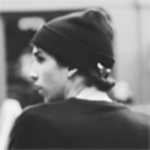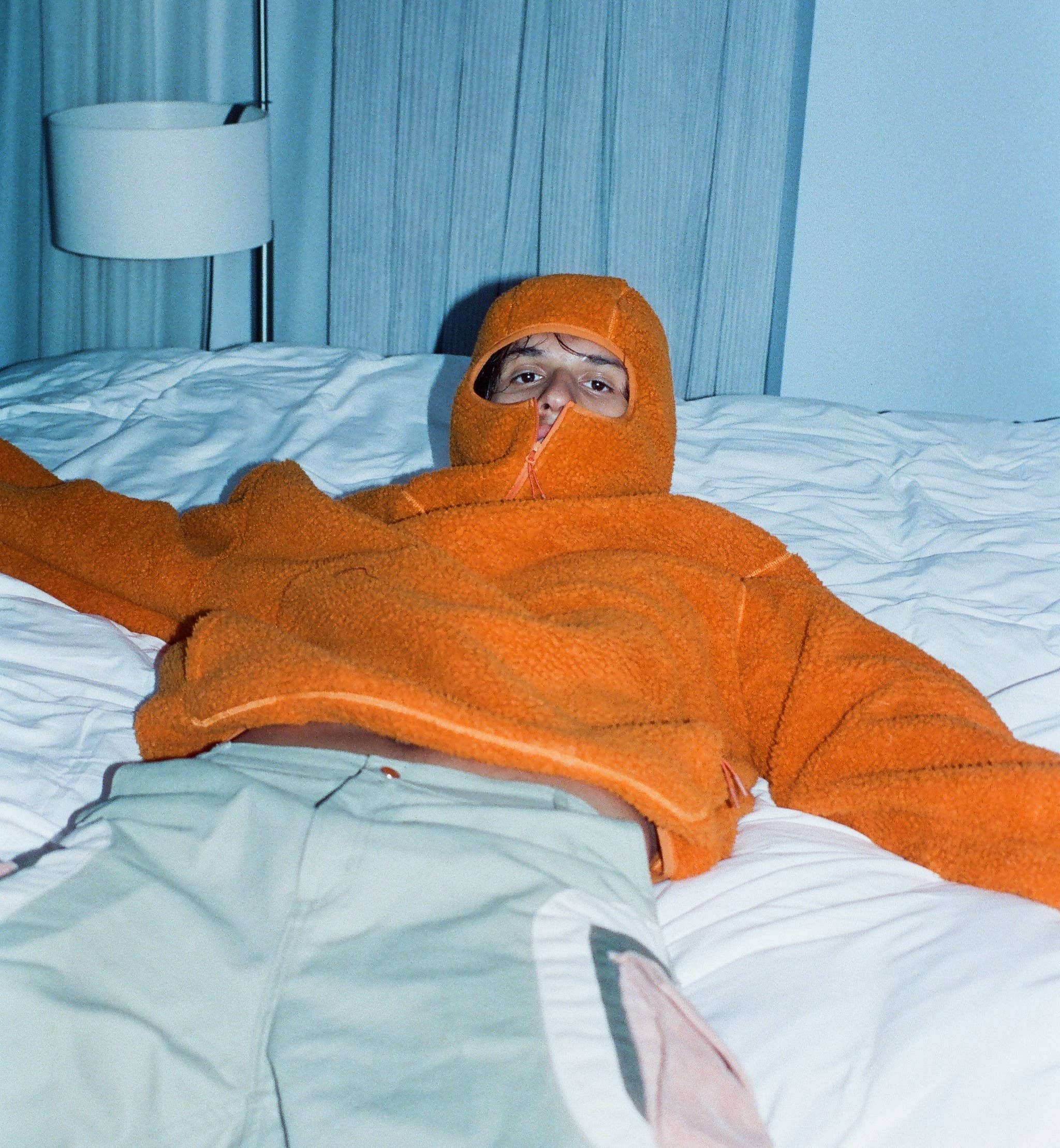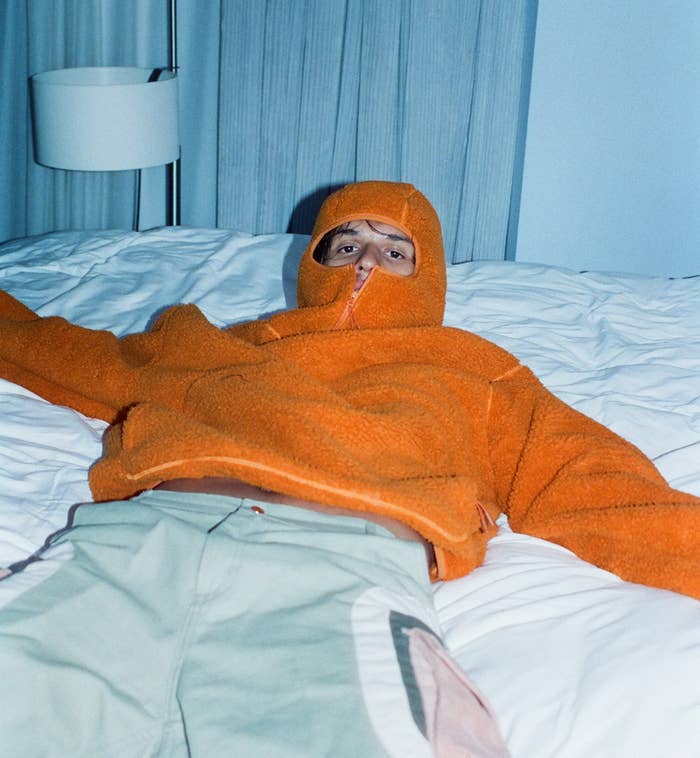
In the summer of 2017, Omar Apollo was recording songs in his Indiana bedroom and driving around in an old car that kept breaking down on the highway.
One of those songs was “Brakelights,” a soulful ode to his shitty car and its malfunctioning lights. At the time, I interviewed Apollo about the track, and even in our brief exchange, the nonchalant charm that would later propel him to stardom was apparent. I distinctly remember him telling our readers, “I hope you guys can play my music on the way home from work to watch your favorite Netflix original.”
Five years later, Omar Apollo and I caught up again, this time to discuss his debut album Ivory. In the half-decade gap between conversations, Apollo has glowed up considerably. Today, he’s one of the most exciting young musicians on the planet, with a knack for making addictive, pop-leaning records that seamlessly blend the sounds of R&B, funk, soul, and hip-hop. And after signing a deal with Warner Records, he swapped out his old car for a new ride that doesn’t break down on the freeway anymore.
The Ivory era began with “Invincible,” a Daniel Caesar-assisted lead single in which Apollo floats addictive falsetto vocals over bluesy guitars, before reminding us of his sneaky ability to deliver melodic rap flows. After that, he dropped “Killing Me” and “Tamagotchi,” the latter of which is a Neptunes-produced banger that has already drawn breathless praise from artists like Tyler, the Creator and Aminé.
The 16-track debut album finally dropped on April 8, representing a milestone that Apollo has been thinking about for years. He’s a big believer in manifestation, and his current status as a burgeoning pop star has been a long time coming. (I use the term “pop” loosely, because his genre-bending style doesn’t fit neatly within any specific categorization.) In the early days of his career, he had a habit of posting photos of Jimmy Fallon to his Instagram page, which foreshadowed his own future successes. Apollo’s lighthearted obsession with the late-night TV host was an inside joke with his fans, but when he ended up performing on Fallon’s show twice within the past year, it represented a full-circle moment. Many of Apollo’s dreams have already come true, but based on the fact that he was in the studio until 3 a.m. the night before our interview, he’s still working hard to achieve new ones.
Apollo’s ascent isn’t the result of a viral gimmick, a TikTok challenge, or even a breakout smash single. The Tyler and Pharrell co-signs didn’t come because he’s riding a hot trend. Since those days in Idaho, writing songs about his beat-up car and hanging out with his friends, he’s been focused on making timeless music, and now it’s paying off.
When I finally caught up with Omar Apollo over the phone, it was the afternoon of March 21, just a few short minutes after he posted the announcement for “Tamagotchi” on Instagram. After laughing and giving me shit for the “Scam Likely” message that my audio recording app delivered on his phone, Apollo spoke about the making of Ivory, the hilarious relationship he has with his fans, which rappers influenced the album, and much more. The interview, lightly edited for clarity, is below.
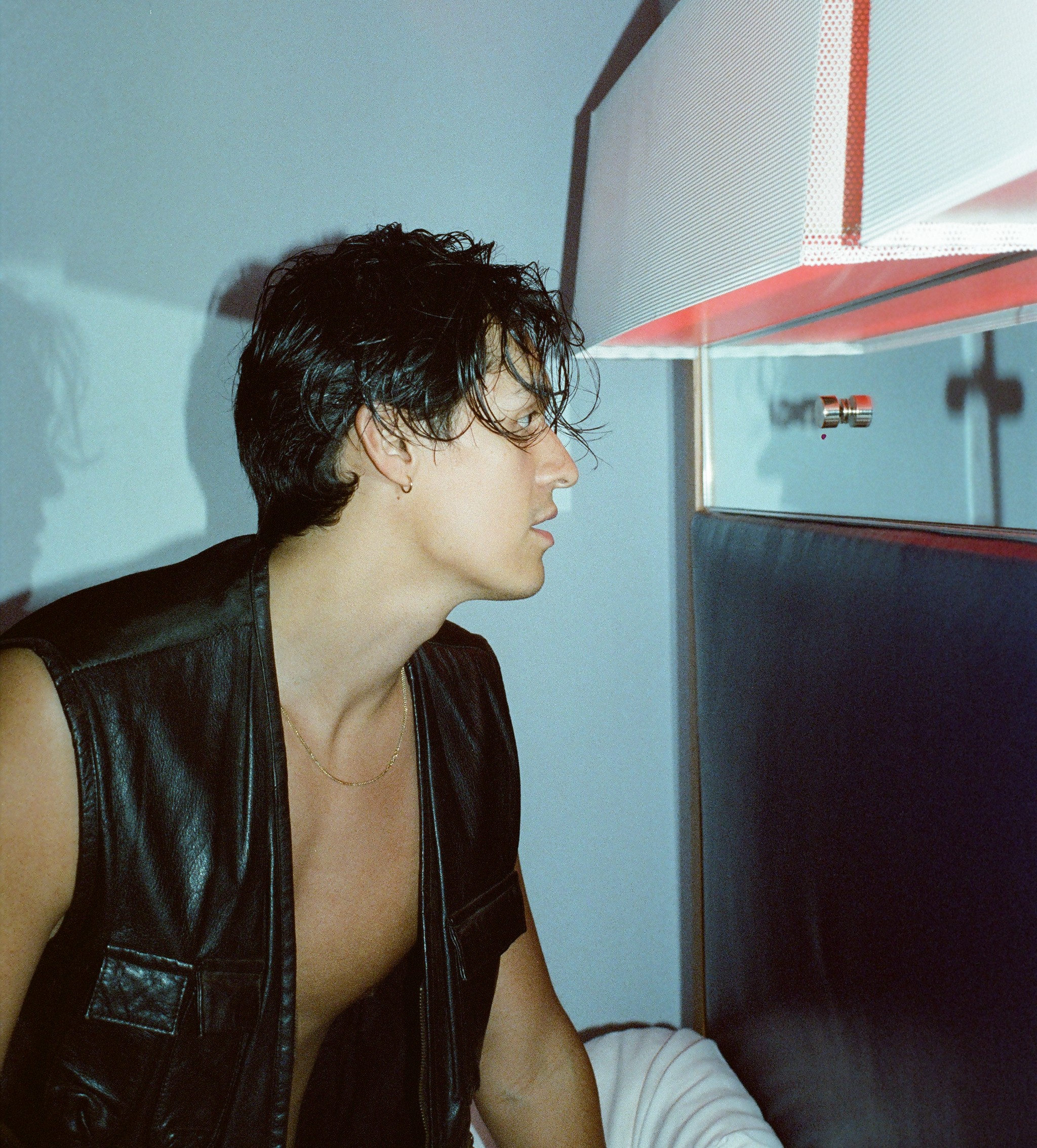
Hey, Omar. What’s going on in your world today?
Dude, I just posted the artwork for “Tamagotchi,” my song with Pharrell and Chad [Hugo]. I literally just did that and drank some coffee, so I’m feeling amazing.
How did you link up with Pharrell and Chad?
I flew out to Miami to work with Pharrell, and when I pulled up, he was super sweet and very polite. There were other sessions happening in the house, so he came back later to hear what I made to his beat, and he just loved it so much. He got everyone and brought them upstairs to hear it. Pusha-T was there, and everybody was just like, “Yo, this is crazy. You got to listen to this shit.” [Laughs.] And I was surprised that he liked it. That wasn’t “Tamagotchi,” though. That was another song, because after that first day, he was like, “How long are you staying? You’ve got to stay longer.” So I extended my flight and we made like four more songs after that, including “Tamagotchi.”
How did “Tamagotchi” come together?
I just came in like how I did every morning. He was working with somebody else, but he came to grab me as soon as I walked in. He was like, “Yo, I got this beat for you. They’re going to load it up right now.” I think he made it the night before, or maybe even that morning. So I went upstairs and started recording right away. That was the fourth song we made, and it was the last day before I left.
“Dropping songs is exhilarating. Dude, I’m glued to my phone when the songs come out. I’m looking at every single tweet.”
What about “Tamagotchi” made you like it enough to put it out as a single for Ivory?
I just love the “Tamagotchi” concept. In my head, I saw the video, and I was like, “Oh this is perfect for the album.” The other songs [with Pharrell] are living places, too, but I thought “Tamagotchi” was right for this project in particular.
What did you learn from working with Pharrell and Chad?
I just learned to trust my instincts more. I was watching Pharrell and Chad make beats, and I saw how much they’re just like, “Yeah, that’s it. Boom, boom, boom.” It’s just like, “All right, that’s the song,” right away. I learned to let the energy be more of a flow, as opposed to overthinking everything. I learned to make it more about the feeling [of the music]. That’s something I always did before, but down the line, you get a little cloudy, because you have other people’s opinions around, saying this and that. But you have to show up and be present, and not be in your head when you’re making music.
Did Pharrell give you any specific advice that stuck with you?
He gave me very specific advice. I played him my whole album, and we were talking for so long. It was crazy, man. I didn’t even sleep that night. It was nuts.
A debut album is a big moment for any artist. Did you have a vision for Ivory before you started?
I tried to have songs like “Tamagotchi” and “No Good Reason,” and songs like “Petrified” and “Personally,” that are in totally different worlds, but on the same project. I really wanted to show all sides of myself, so I can listen to the album and be like, “Oh yeah, this is me.” I want to feel satisfied, like I didn’t miss out on something. It’s all there.
What did you learn while making this album?
The album taught me so much more than I could have ever imagined, because now I’m like, “Oh, I’m just getting started. This is just the beginning.” It feels literally like the beginning for me right now, because I didn’t stop making music. I’m already making more shit. I was in the studio last night until 3 a.m. It don’t stop. It just really made me want to make more albums.
Did you have any turning points while making Ivory? Was there a moment when everything started clicking into place and you realized what the album was going to become?
There was. There was a point in time where I had a whole other album. The only songs on that album [that ended up on Ivory] were “Bad Life” and “Waiting On You.” Oh, and “Mr. Neighbor.” Then I had these other 13 songs that I ended up scrapping.
I just separated myself for a couple weeks at a time after scrapping the other album. I’d rent a house and work out of it for whatever amount of time I needed. I kept doing that for three months until I made a whole new album, which is what you’re hearing now. I did the whole thing with [producer] Carter Lang, besides the Neptunes song and “Evergreen.” He was there throughout the whole process and he was super down when I was like, “Yo, I’m going to make a new album.” He was like, “Alright, bet. Let’s do it.”
It was definitely a decision I had to make and stick to it. I had to have the assertiveness to tell everyone, which was weird. Then I had to cancel my tour, because in order to make the rest of the album, I had to create time. I wanted to finish it in time to drop it right before Coachella. So that was the turning point, honestly, knowing that I had to tour again but didn’t have the music yet.
Throughout the album, you switch between English and Spanish really seamlessly. Did it take a while to perfect that?
Definitely. It was weird, because I had more confidence singing in English, because I was educated in English. All the slang and shit is English. The Spanish that I learned was from my parents, so it’s not like the young Spanish—it’s the older generation Spanish. My parents didn’t curse, so I wasn’t really exposed to that, and I had to figure that out on my own, through movies and going to Mexico.
I went to Mexico a lot for this album. I wanted to throw myself into it, so I could learn the language as fluently as I do English. It’s a lot easier for me to break things down in English, when it comes to being complex with the writing, and all that stuff. It’s taken a lot of practice. I have some people who I only talk to in Spanish, and I told my parents not to talk to me in English anymore.
“My fans treat me like a deadbeat cousin. [Laughs.] It’s crazy. They’ll see me and they’ll flick me off, and I’m like, “Yo!” It’s funny. The humor is the same. It’s sick.”
How do you decide which lyrics to write in English, and which ones to write in Spanish?
On “Tamagotchi,” it just kind of came out like that. I didn’t really think about it. On “Killing Me,” it was the same thing. It kind of just happened. In the past, it was more of a decision, but now it’s just a feeling. When I hear a word in English or Spanish, it inspires me to write. So if I get that word, whatever language is, then I’ll throw it in.
Why is it important for you to sing in both languages?
In my everyday life, I speak more English than Spanish, but I speak both. And honestly, once I started touring, I was seeing all these Latino people at the shows, telling me, “Please make more songs in Spanish.” Even my parents are like, “Please make more songs in Spanish for us.” Because they don’t understand what I’m saying, usually. When I play “Frio” at my shows, it’s the loudest song, so I’m like, “Oh, I’ve got to just keep doing this.”
I realized that a lot of people in the United States are first-generation Latinos, and they just want to feel relatable. I knew that my Mexican friends in Indiana were also all first-generation, and we had so many cultural things that our families would do together. And it’s really important, because we’re not in Mexico. We’re in America. So it’s important to bring those traditions over and have a mix of cultures.
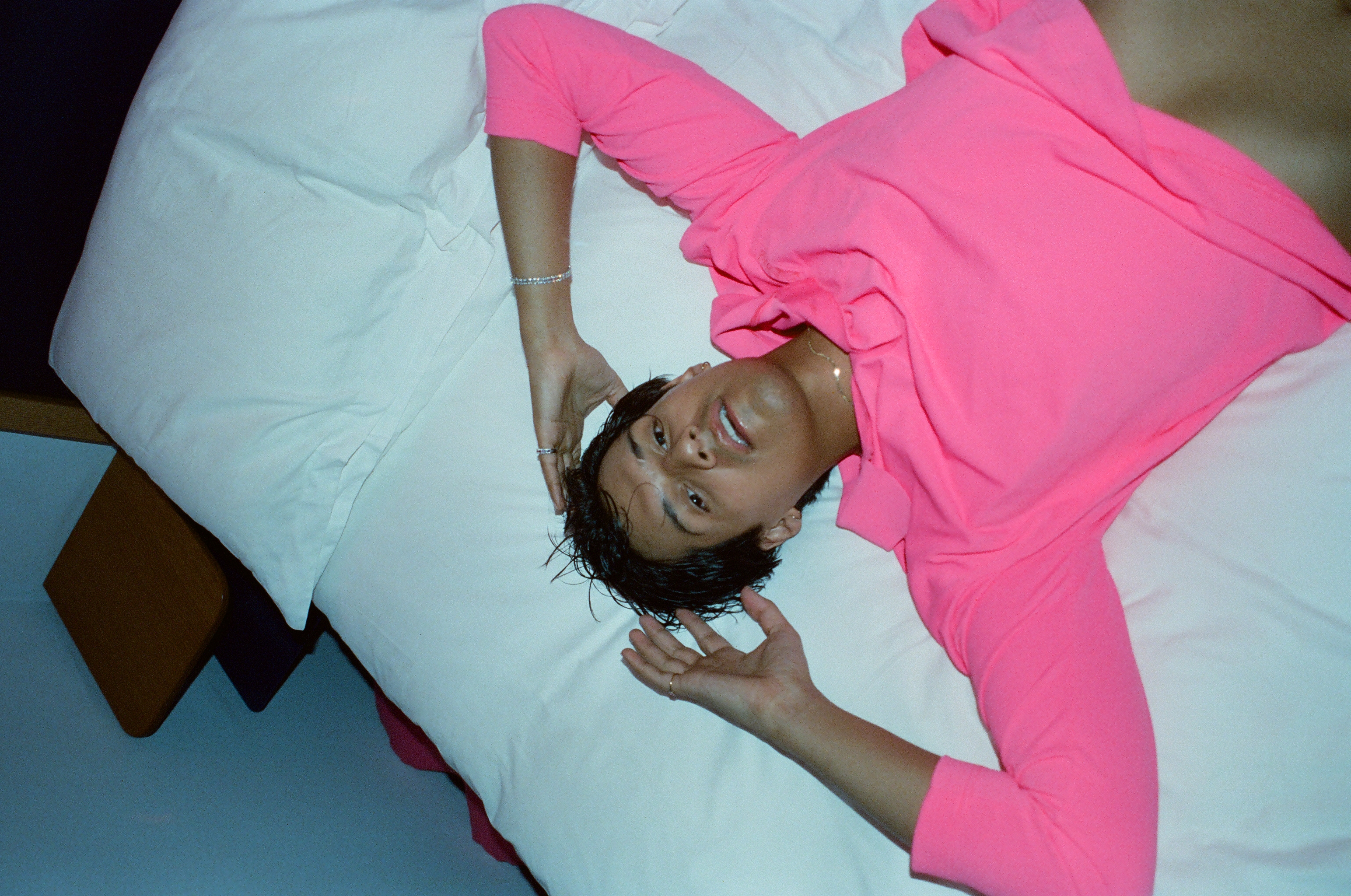
People think of you as a singer, but you’re low-key a great rapper, too. On Ivory, especially, you’re playing with a lot of different flows. How did you develop those skills?
Oh, man. I started rapping. At first, I wasn’t comfortable with singing, so I’ve been rapping for as long as I can remember. Me and my friends were just in the garage, rapping. We’d be wearing jackets, in the middle of winter, just rapping for hours and hours, making a bunch of rap songs. Rap has always been a part of my life. It was always super fun, and it was cool to bring it back, because I love rap music. I’ll just feel myself thinking, like, “Oh, I want to rap on this.” Then I’ll throw in the melodies.
Were there any rappers you were listening to a lot while making Ivory, and taking inspiration from?
Yeah, of course. A lot of Kanye. Jay-Z. André 3000. Oh, and Chucky73. He’s a Dominican rapper. He’s fire.
While we’re talking about rap, I have to bring up Kenny Beats, who you’ve formed a close bond with. How would you describe your relationship with him?
We had really good chemistry right away, and we have the same sense of humor. My first session with him, I came in with my bass. I didn’t have a case, so I just walked in with my bass, and then he was like, “Yo, you just come in here with no fucking case? Who the fuck are you?” And then he would tell that story to everybody. Like, “Yo, Omar just walked in my studio with the bass, but no case.” He’s like, “What’d you do, just put it in your trunk?” [Laughs.] He’d always joke around like that, and he’s really funny. We’d also have really good conversations, because when you’re writing with somebody constantly, you get to asking questions and start talking about personal shit. So we’ve gotten really cool with each other.
When you first started out, you were making most of your songs alone in your room. Has it been challenging to switch gears and suddenly work with these big A-list producers?
As long as everybody in the room is thinking about the song and not thinking about, like, “Oh, I want this kind of credit,” then I’m cool. As long as it’s like, “I know you fuck with the song because you’re here, so let’s do everything for the song,” I’m cool with it. It’s complicated. But I can tell when I have that chemistry with somebody. Pharrell’s that type of person. So is Carter and Kenny and Teo Halm and Oscar Santander. Those are the people I choose to work with. People who care about the music.
How do you think you grew as a musician while making this album?
I feel like it’s been the same thing since I was 17. It’s just different, the way you think about it, but it’s the same process every time.
What about how you’ve grown as a human? Have you noticed any changes in yourself while working on Ivory?
I’m really the same for the most part, but I do think I’m getting more comfortable. Making music is very vulnerable, and I always used to feel kind of embarrassed when I played things for people. I used to get so annoyed when somebody would ask me to explain what a song is about. But now, I’m willing to explain and willing to talk about it. I’m not embarrassed.
The first time we spoke was back in 2017, and you were telling me about “Brakelights,” which was inspired by your shitty car that was always breaking down on the highway. Do you think back on those days often and process how far you’ve come?
I don’t really. I don’t know why, but I don’t think about the past that much. Just because I used to get stuck in it, so I’m focused on moving forward now. But I do remember that, and that’s funny. [Laughs.] I’m just like, “Well, I’m not driving a shitty car now, so it’s all good.” [Laughs.]
I remember you always used to post about Jimmy Fallon on Instagram back in those early days. It was like an inside joke. And now you’ve performed on Jimmy Fallon’s show two times in the last year. What was that experience like?
I was super excited. The second time I went, I actually got to go and meet him, and he was talking to us for a long time. He was talking to us for like 25 minutes after the show, and we were just chopping it up. He was telling us all these cool stories, and I was just like, “Damn.” It really hit me, like, “Man, that’s tight that he knows who I am now.” It’s cool. It was like an inside joke thing, but I’m a fan. I’m a big fan. So I’m just like, “Yo, this is so sick.” Me and my guitar player really like one of his songs that he made—one of his comedy songs that Mark Ronson produced. So we brought that up to him, and we were singing it to him. He was just like, “Yo, you know that shit?” [Laughs.] It was hella cool. That was a full-circle moment for sure.
Do you believe in manifestation and putting shit out in the world so it comes true?
Yeah. It happens every day in different ways. Absolutely. And you’ve got to be careful, if you think about it, because you could manifest some shit that you don’t want to happen. But yeah, it’s really crazy, because I definitely believe in that shit. It’s 100 percent real.
“I’m already making more sh*t. I was in the studio last night until 3 a.m. It don’t stop. It just really made me want to make more albums.”
How would you describe your headspace lately?
I’m just focused right now. I’m shooting a video today, and I’ve got to go to rehearsals in two minutes. So it’s just rehearsal, studio, video, press. I’m just being focused and trying to go to the gym, trying to eat healthy, and get ready for the road. I’m doing vocal warmups, trying to be prepared.
What can fans expect from you on tour? What will the shows be like?
They can expect some silhouettes. They can expect some drama, some styling, some visuals… I don’t want to give away too much, but it’s put together. Just know that.
What’s your favorite song right now?
Let me check. Probably “Saving All My Love For You” by Whitney Houston. That’s been my song for the past three days.
What song are you most excited to perform on tour?
“Petrified.” And “En El Olvido,” because I sound really good on it. It’s really in my key. It feels good after you perform. You’re like, “Oh yeah, I did that.” [Laughs.]
When you think about the next few months, what are you the most excited about?
Putting out this album. The day it comes out is better than your birthday. It’s crazy. Dropping songs is exhilarating. Dude, I’m glued to my phone when the songs come out. I’m looking at every single tweet. I’m looking at everything.
And I can’t wait to see all the fans again [on tour]. It’s been so long. That shit was fun, man. I was on the road for two years before the shit went crazy, so I was used to that life. I was like, “Yeah, this is my life now.” I was like, “I’m outside. I’m traveling, I’m exploring.” I like doing that shit. That shit inspires me a lot.
Yeah, I can tell you have a really close bond with your fans.
It feels like they’re all my cousins. It’s like, “Oh, Omar. What’s up? And they treat me like a deadbeat cousin. [Laughs.] It’s crazy. They’ll see me and they’ll flick me off, and I’m like, “Yo!” [Laughs.] It’s funny. The humor is the same. It’s sick.
